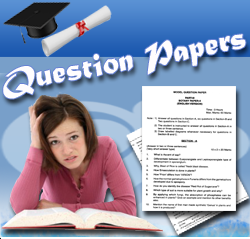ADIKAVI
NANNAYA UNIVERSITY
RAJAHMUNDRY
GENERAL
ENGLISH
(Ability
Enhancement Compulsory Course-AECC)
[For
FIRST YEAR B.A/B.Sc./B.Com]
EXAMINATION
AT THE END OF SECOND SEMESTER
MODEL
QUESTION PAPER
[Andhra
Pradesh Common Core Syllabus (CBCS) Effective for I year from 2015-16]
Time: 3
Hours
Max Marks: 75
Section
– A [Prose]
I. Answer any
THREE of the following short answer questions 3x5=15
a) How does Dr. B.R. Ambedkar bring out the ‘need
for a moral regeneration in Hindu Society’?
b) How does science, according to JBS Haldane,
affect the life of an average man?
c) Compare and contrast the scientific point of
view and God’s eye view.
d) What are the models of greetings of Japanese,
Indians, Chinese, and the Arabs?
e) What, according to Gardiner, are the
disadvantages of shaking hands?
Section
– B [Poetry]
II. Answer any
THREE of the following short answer questions. 3x5 = 15
a) “Season of
mists and mellow fruitfulness”. Explain.
b) How does Keats personify Autumn in the second
stanza of his ode to Autumn?
c) Is there any undertone of oppression of women
in Margaret Atwood’s poem, “This is a
Photograph of Me”? Explain.
d) What does Kishwar Naheed tell about the woman
in the first two stanzas of her Poem, “I am
not that Woman”?.
e) How does Naheed feel about marriage and what
is she trying to say to this world?
Section
– C [Short Stories]
III. Answer any
THREE of the following short answer questions. 3x5= 15
a) How did
Sitaram convey the information given by Nathu to Mrs. Srivastava, in the Story,
“The Boy who broke the Bank”?
b) What was the
actual reason for the collapse of the Pipalnagar Bank? How did Ruskin Bond
brings out the attitude of the people at
this situation?
c) How was Subbiah trained by his father in the
rice-business?
d) How did Subbiah meet his tragic end in the
story, “Half-a-Rupee worth?
e ) How does the
relationship of Ruchira and Biren reflect a combination of Indian and
American cultures?
Section
– D [One Act Play]
IV. Answer any
TWO of the following short answer questions. 2 x 5= 10
a) How does
Lomov express his thoughts alone onstage in a monologue?
b) Bring out the
causes for the first and the second arguments between Natalya and
Lomov ?
c) Is the
proposal and the acceptance of marriage proposal natural and normal ?
What do you think are the deviations?
d) What does the
play, “The Proposal” suggest about Chekhov’s attitude toward this class of
landowners? Cite evidence to support your
answer.
Section
– E [Language Activity]
V. Answer all
the questions. 4
x 5= 20
1. Read the
following passage carefully and answer the questions given below it.
Pollution is the fouling of the
environment, land, water and air by waste, smoke, chemicals and other harmful
substances. The most serious pollution occurs, where there are large cities and
many factories. Every industrial country faces the problem of disposing waste.
As factories produce new goods for people to buy, old ones are thrown out with
the household rubbish. Burning this refuse pollutes the air, dumping it in
rivers and seas pollutes the water. Getting rid of plastics is particularly
difficult. Wood and paper decay after sometime through the action of bacteria.
But plastics never decay. With millions of tonnes of rubbish being dumped into
the sea, marine life is greatly harmed. Smoke from factories and gases from
motor vehicles pollute the air. Carbon monoxide gas and substances called
hydrocarbons from the engines of motor vehicles damage people’s health. Ridding
our world of pollution is an imaginably big task.
Questions:
a) What is meant of “Pollution”?
b) Where does serious pollution occur?
c) What is very difficult to get
rid of?
d) How do wood and paper decay?
e) How is marine life harmed?
2. Fill in the
blanks in the following sentences with suitable Form of the Verb given in the
brackets.
a) Dolphins __________ (live) in water.
b) Srilatha ____________ (work) in Hyderabad Public
School for the last ten years.
c) The train ___________ (leave), when we reached
the station yesterday.
d) The men ______________ (repair) the telephone
cables. Do not disturb them.
e) Health _________________ (be) wealth.
3. Answer any
ONE of the following.
A) Write the Interrogative
Sentences for the following responses.
a) He lives in Hyderabad.
b) She is writing letters.
c) You know him.
d) There are two cars.
e) I am Rakesh.
(OR)
B) Match the following sentences
under Column “A” with their correct “Question Tags”
under Column “B
A
B
1. He is an engineer [
] a) Are you ?
2. We are Indians [
] b) Will you ?
3. She has been to London [
] c) Isn’t he ?
4. You are not paying
attention [ ] d) hasn’t she ?
5. Don’t waste your time [
] e) Aren’t we ?
4.
Answer any ONE of the following
A) Write a composition using the
hints given below.
[Write the composition in logical
order and develop it with the help of your points also, if any.
Suggest a Title a topic sentence and sum it up.]
Hints:
Reading hobby – good and bad books – for
the hour and forever – books as best companions – they entertain, educate and
enlighten – make one forget one’s loneliness guide and make one’s life richer –
a good book, a life blood of master’s spirit – Carlyle’s
Concept of true
university, a collection of books.
(OR)
B) Write a “Dialogue” between
your mother and you on a Birthday dress.
Situation:
You plan to buy
an expensive set of clothes for your birthday. But your mother is opposed it.
How would you convince her? Write out this situation in the form of a “Dialogue”,
with five terms each to you and your mother.




























